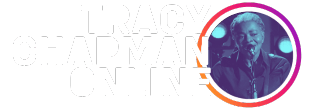![]()
![]() By Madeleine Murray © The Sidney Morning Herald, Dec 19, 2005
By Madeleine Murray © The Sidney Morning Herald, Dec 19, 2005
Madeleine Murray catches an intimate performance by singer-songwriter Tracy Chapman and finds she’s still talking ’bout a revolution.
Judging from the beatific look on his face, the gay pharmacist from Ithaca, upstate New York, is having a good time. Since this is New York, we’re chatting away like old friends, even though we’re strangers, while we wait for Tracy Chapman’s “conversation with music”.
A serious Chapman fan, he once drove from Germany to Paris when he found out she was playing that night. The concert was sold out, but he managed to get a ticket at the gate.
“She’s huge in Europe,” he tells me across the candlelit table shoved up against the stage. “She’s really shy. She was rumoured to be with Alice Walker, who wrote The Colour Purple. The tickets for this were sold out five minutes after they went on sale.” Not surprising, as the room holds only about 200 people.
Chapman plays sell-out concerts around the world, yet here she is in this tiny club with red walls on West 26th Street. The only source of light seems to be the flickering candles on the tables. I arrived half an hour early, a good tactic for The New Yorker festival events, and for my efforts have scored a seat so close to the small stage that I stash my handbag beside the drum kit.
Two women walk out as lights come up softly on the stage. The New Yorker’s senior editor, Dana Goodyear, perches on the high director’s chair. Chapman’s dreads swing as she talks and laughs; she doesn’t seem shy at all. When Goodyear asks the first question, about her life at college, Chapman talks away for about 15 minutes.
Chapman majored in anthropology and African studies at Tufts University, Boston, in the early 1980s. One night, when she and a group of friends were broke, they persuaded her to busk in Harvard Square so they could get Chinese takeaway.
“I set up and played and froze a little bit and made us $30, and bought us Chinese food. I realised it was something I could do from time to time,” she says.
This gave her enough confidence to get a licence to busk: “I met lots of interesting people. People would drop all sorts of things in my case, I would get little notes and jewellery and phone numbers. One night I finished and a woman approached me and said, ‘I would love for you to come and play at my house.‘ ” The “house” turned out to be in Argentina. The woman offered to fly Chapman down, all expenses paid, over the Christmas break.
I ran it past my friends. Half of them said, ‘You should go, chance of a lifetime.’ The other half were like, ‘Are you crazy? It’s probably drug-running. Besides, we need you to buy us takeaway.‘
“I’m usually a cautious person, but I took the trip. It turned out to be an amazing experience. She was just a serious music lover. I went to her house, saw her record collection. She had Nina Simone, Billie Holiday, Whitney Houston, Ella Fitzgerald and Sarah Vaughan. She had all these records of black women singers and she liked my music.”
The prescient Argentinian must have been pleased when a few years later, in 1988, Chapman burst on to the scene with her eponymous debut album. The first two tracks, Talkin’ ’bout a Revolution and Fast Car, raced up the charts.
Seven CDs later, she has never had such big hits again, but she is still a force majeure on the singer-songwriter scene. With her warm contralto and honest lyrics, she’s not Britney Spears or MTV fodder. She just writes and sings, performs for human rights with people such as Sting, and lives in San Francisco with her two dogs.
Singer-songwriters with a social conscience are not fashionable in the new millennium. A Rolling Stone reviewer once wrote: “Tracy Chapman has never been a mirth merchant, but her sixth album, Let It Rain, is a bum trip even by her sombre standards. It’s a harrowing trip, and while clearly heartfelt, one is left with the impression that Let It Rain isn’t so much meant to be enjoyed as pitied.” In spite of excoriating critiques such as this, Chapman, like Sinead O’Connor, who isn’t a music industry minx, will always have an audience.
Like most successful people, she began early. “When I started writing songs as a young child I was really prolific, I would write five or six songs a day. I wrote poetry and short stories, I was generally drawn to writing because I loved reading.
“My family used to play this trick. I had an uncanny ability at a very young age to remember the lyrics of pop songs, so my mum would put me on the phone with my relatives and I’d just sing an entire Aretha song.
“Ukelele was my first instrument, then clarinet for six years. I really wanted to be Benny Goodman, thought maybe I would be in an orchestra, band or choir. We had a keyboard in the house, I wrote some of my early songs on the keyboard. Then I really fell in love with the acoustic guitar.”
At this point, there is no sign at all that Chapman is shy. “Shy” is perhaps just a euphemism for performers who don’t want to buy into inane media scrutiny.
She talks some more, about being a college athlete and building her own recording studio for the latest album. Then it’s time for some music.
The band set-up has an iconic look – strong, black Chapman flanked like caryatids by two pale, ethereal types. The bald bass player, Joe Gore, looks like he just left Odessa. Drummer Quinn, with fur boots and a Russian fez, shakes vials of rice, brushes drums and uses little sleigh bells as part of his delicate percussion.
Chapman is gracious enough to play her old hits. Introducing Give Me One Reason, she says, “This is autobiographical. I left it on someone’s answering machine, and it worked. I wrote it late one night hanging out with my dog, a mini-daschund.”
After Revolution and two other songs, she leaves to perform in a New Yorker benefit for victims of Hurricane Katrina. The pharmacist and I look at each other and sigh happily.

